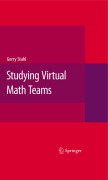
The nature of group cognition and shared meaning making in collaborative learning is an important research issue in CSCL. More generally, perhaps, the theme of sense making is a central topic in information science. While many authors pay lip service to these topics, few have provided much detailed analysis ofthe mechanisms of intersubjective meaning making as a foundation for understanding processes involved in collaborative learning and knowledge building. This book centers on detailed empirical studies of how students in small online groups make sense of math issues and how they solve problems by making meaning together. These studies are woven together with materials that describe the online environment and pedagogical orientation, as well as reflections on the theoretical implications of the findings in the studies. Offers comprehensive theoretical framework of CSCL field Offers an extended research agenda Brings together previously fragmented literature INDICE: Vision: Explorative Learning.- Approach: Iterative Explorations.- Analysis: Online Social Practices.- Case A: Greater than the Sum.- Case B: A Failed Proposal.- Case C: Pointing in Virtual Spaces.- Case D: Disembodied Meaning Making.- Case E: A Knowledge Community.- Pedagogy: Collaborative KnowledgeBuilding.- Technology: Collaboration Support.- Methodology: Chat Interaction Analysis.- Paradigm: Case Studies & Design Explorations.- Theory: Group Cognition.
- ISBN: 978-1-4419-0227-6
- Editorial: Springer
- Encuadernacion: Cartoné
- Páginas: 615
- Fecha Publicación: 01/07/2009
- Nº Volúmenes: 1
- Idioma: Inglés
